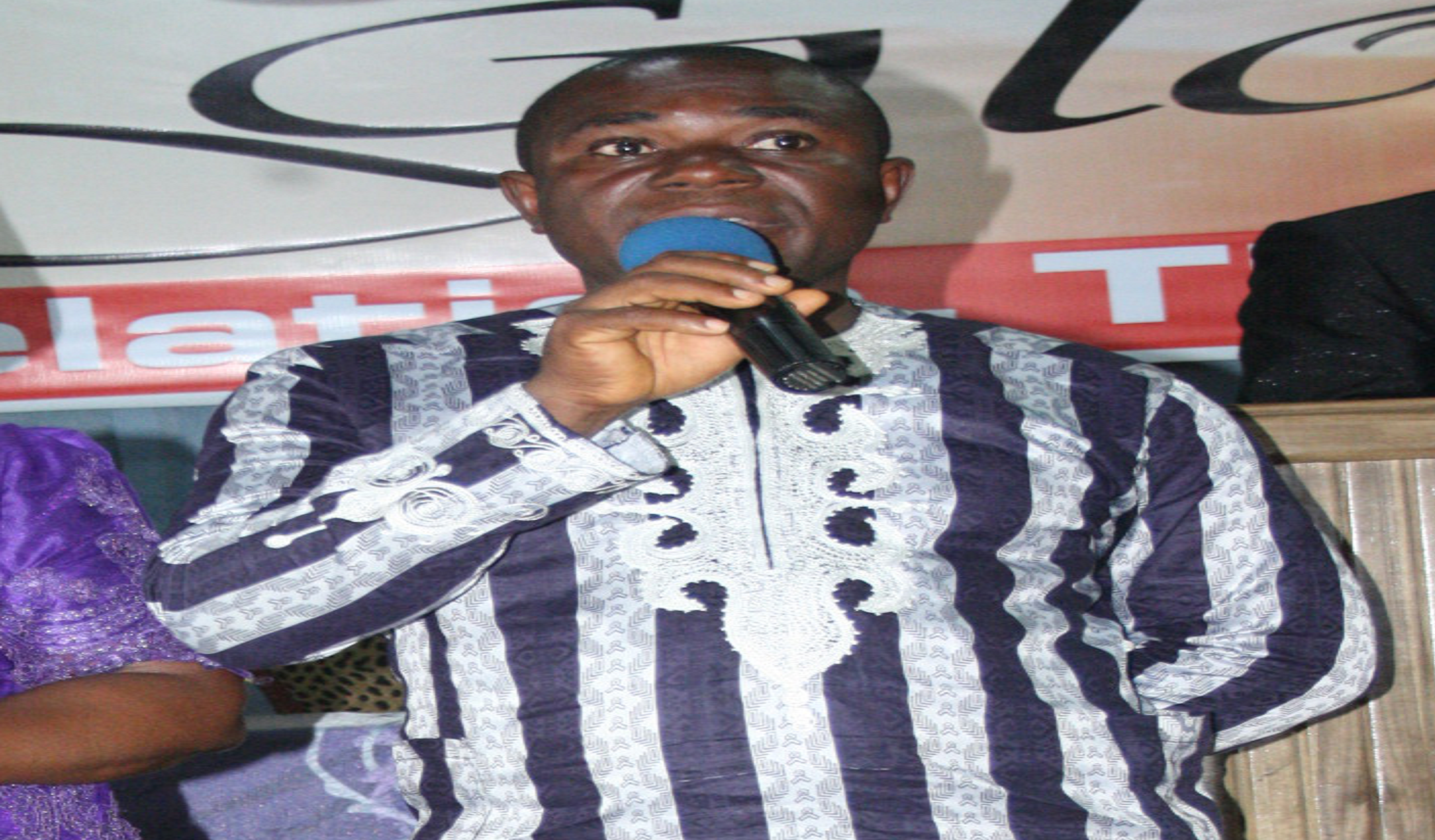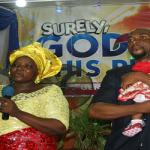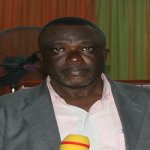
MY name is John Uzoma of the Agric Parish of the Watchman Catholic Charismatic Renewal Movement, Lagos. It all started on Sunday, July 20, 2014, when late Mr. Patrick Sawyer (the diplomat from Liberia through whom Ebola entered Nigeria) came to the hospital where I worked at about 9.30pm for treatment. He was placed on admission and the laboratory scientist took his blood sample for the necessary procedures. In trying to give him the required attention, some of the hospital staff had contacts with him. We were all at that time ignorant of the nature of his illness. The next day, as the protocol officer, I entered his ward for about eight times before I left at the end of the day and I had contacts with him on three occasions. The most surprising thing about this episode was that some members of staff who did not even have any direct contact with him unfortunately died, including a doctor.
He was admitted to the VIP Ward and when I went to check on him the following day, I saw him coming out from the rest room, panting. After exchanging pleasantries I made to go but he asked me to wait. I noticed that he was restless and was moving from one bed to the other. He told me he was tired and that I should help him to remove his socks from his legs. In my mind, I said though it was not my duty but because of a laid down rule that if a patient needed help and it was within our capacity to assist, we should not hesitate to do so, or we should call the attention of the nurse assigned to the particular patient to do that. With that at the back of my mind, I helped him to remove the socks and as would be expected, that brought me in close contact with him. When I wanted to leave he said he had been calling the nurses for attention but none of them had responded. I showed him the call bell fixed on the wall beside the bed and told him that anytime he needed attention he should press it and someone would show up. But I pressed the bell only to discover that it was malfunctioning. I also noticed that there were blood stains around it, obviously from him.
I left afterwards and called the attention of the nurse assigned to him. As at that time, we were still not aware of the nature of his sickness. Later that day, somebody paid him a visit and after he had had contacts with him, I greeted him and we shook hands before he left. He gave me a SIM card to be given to the patient and in the process of doing so we had body contact again. At the end of the day, I handed over to my colleague and left. Sometime in the day, I called my colleague to enquire about the patient in the VIP ward (Mr. Sawyer), whether the result of his blood sample was ready. He told me the result had arrived from Dakar, Senegal, where it was taken to and it showed that he had Ebola virus which is more dangerous than HIV/AIDS. When I reported for duty the following day, it was confirmed.
At that juncture, our doctor (Mrs. Ameyo Adadevoh who was later killed by the Ebola disease), informed the Lagos State Government and some officials brought some kits and instructed that only one person (a nurse) should be attending to him. The nurse assigned to him was the one that later travelled to Enugu and had to be brought back to Lagos because of the fear that she might have been infected by the virus. Some members of staff were infected, but thank God quite a number of them survived; they responded to treatment and were later discharged. But, sadly, some others were consumed by the virus. I had the symptoms after about two weeks of my contacts with the patient. It was on a Monday at about 3.30 am; my wife had left for a vigil. I noticed that I had a stomach upset and reported my experience at the hospital. I was quarantined and given a thermometer so I could be monitoring the situation myself. From time to time, they would call for the result so they would know the next line of action if there was retrogression. The monitoring period was for three weeks and throughout the period I was updating them with the results of the reading on the thermometer. Apart from the late Mr. Patrick Sawyer, I also had interactions with most of the hospital staff during this period. One of the nurses, now late, took a biscuit from me and ate. There was no sign that she had the Ebola virus.
The female doctor who was quarantined and treated at Yaba but survived the illness also had contact with me. The nature of our job is such that there is always inter-personal working relationship that one cannot avoid. Some of my colleagues withdrew their closeness from me when they became aware of the situation. However, after I had completed the monitoring period some came to congratulate me and jokingly referred to me as the man that Ebola jammed and bowed.
In the house, whenever my little daughter was retiring to bed, she would come to hug me and bid me a good night’s sleep. But when I was exposed to this experience, I would chase her away each time she wanted to get closer to me so as not to expose her to the danger of the virus. My first daughter was aware of the incident and came to ask questions when one of the TV stations aired the news of the consultant physician at our hospital who had contracted and died of the disease. She said it was mentioned that she worked at the same hospital where I also worked. I dismissed her by telling her not to disturb my peace so that she would not probe further. The very night my wife attended the vigil and I had the stomach upset, I wasn’t able to sleep until she came back the following morning. I told her of my experience and said I wanted to go to Yaba to report it but she was not comfortable with the idea. She suggested we first go to see one of the sisters in the prayer warrior group for prayers. When we got there, in the course of prayers, she spoke against death and said that she was seeing by revelation a coffin in my father’s compound. She proclaimed that I would not die and soon after that we left. I had all the three symptoms associated with the virus, namely: fever, cough and stooling. I made sure I took the drugs that could neutralise the symptoms. I was on self-medication.
Sometimes, while on my way to church, I would deliberately sit where there would be enough space between me and the other passengers in the bus so as not to have any close contact with any person. From my place to Agric is only a bus stop away so I would try to be cautious. In the church, I would go and sit at the back where in most cases there would not be too many people. I thank God that today, I am healthy and okay. My colleagues in the office wondered how I survived the virus though I had contact with the principal patient but some of them who did not get closer to him unfortunately died. My answer to their curiosity was that it was the God of Watchman that delivered me. Every now and again, my wife would pray and lift up lamentations to God against the virus. She would also pray to God to spare my life and not make her a widow suddenly. Her prayers and that of our pastor who was aware of the situation were factors that saw me through.
I have reasons to believe that the Liberian man was aware of what was wrong with him and purposely came to Nigeria to infect people with the deadly virus. He had a lot of dollars in his possession and tried to lure some members of staff with his money so they could get closer to him and be infected. A day after he was admitted to the hospital, he requested that I should give him a bath but I politely told him I could not do that. He pleaded passionately with me and even suggested I look for two other male nurses so that the three of us could give him a bath. You can imagine what would have happened if we had obliged him. It would have increased the number of infected people. I left him and went away but he would from time to time send for me to come and see him. I thank God that I ignored him; I thank God for delivering me from the pangs of death and also thank our pastor who was there for me and encouraged me to believe God and His wondrous works in the lives of men. I want to say that we are indeed serving a living God in the Watchman. Praise the Lord”.


